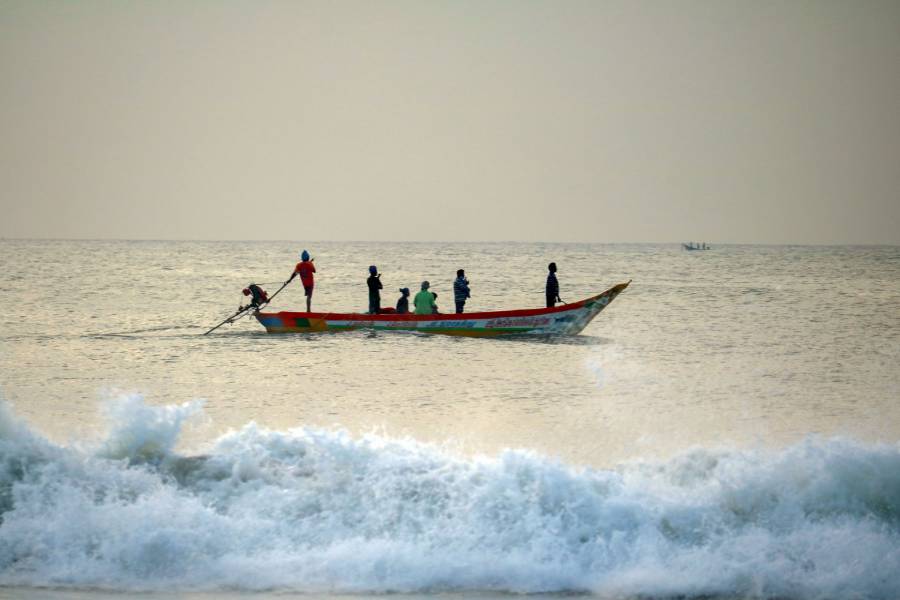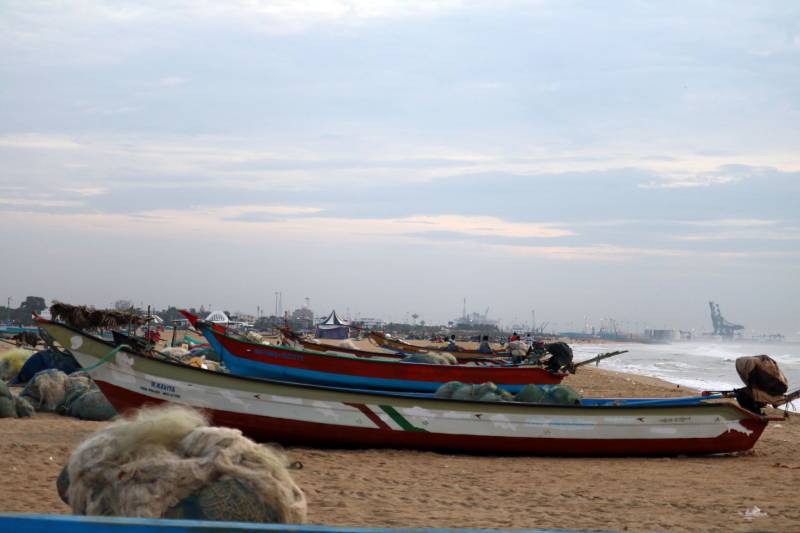Marine Fishing Bill 2021: Tamil Nadu fishermen remain firmly opposed

Marine fishery is an important segment of the Tamil Nadu economy, employing over 1.1 million people in 608 coastal villages (MIG Photos/ Aman Kanojiya)
Fisherfolk across the country have come out in strong protest against the Marine Fisheries Bill 2021, scheduled to be tabled in the ongoing session of Parliament. The fishermen attack the bill not just for the content, which threatens to deprive them of their livelihood, but they are also very upset about the process of drafting the bill, which was non-participatory and secretive, say fishermen’s unions.
The fishermen are protesting against the ambiguity in definition clauses, the complexity in the process of licensing and registration, weakening of the states’ powers and the loss of revenue to states along with likely harassment of fishers for stringent penal provisions.
Little wonder then that most of the state governments with a coastline whose fishermen will be impacted by the bill, have come out openly against the bill. At the forefront is Tamil Nadu chief minister M K Stalin. “We understand and appreciate the need to protect and preserve the marine eco system, we also consider it equally important that the livelihood and interests of the traditional fishermen are clearly protected” said Stalin, while asking Prime Minister Narendra Modi not to move the highly controversial Marine Fisheries bill in ongoing monsoon session of the Parliament.
“The bill was being moved without adequately addressing the concerns and well-being of Indian fishermen and certain clauses infringed upon the rights of the state,” he added, saying a fresh draft should be introduced in the Parliament after due consultations with the fishermen.
Marine fishery is an important segment of the Tamil Nadu economy, employing over 1.1 million people in 608 coastal villages. With a coastline stretching to over 1100 km and an exclusive economic zone of 190,000 sq km, the state accounts for almost 700,000 tonnes of marine fishery products or about 5 pc of the total fish production in the country.
Indian Marine Fisheries Bill 2021
The fishermen say there are problems with practically each section of the bill that they say seems to have been designed to harass and harm them, instead of protecting them. For instance, sections 3 to 8 of the bill refer to licensing for fishing in the Exclusive Economic Zone and beyond. This creates doubts if the fishermen need multiple licenses for different parts of the sea.
Sections 9 to 13 refer to “monitoring, control and surveillance measures, illegal, unreported and unregulated fishing”. The National Fish Workers Forum demanded that the penalty provisions have to be withdrawn. The fishermen could be penalised for not keeping logbooks and the navigation and vessel monitoring equipment.

Empty boats lined up at Marina Bay in Chennai, Tamil Nadu (MIG Photos/ Aman Kanojiya)
As with their colleagues from other parts of the country, fishermen in Tamil Nadu say their biggest concerns and reasons for opposition to the bill comes from the fact that even though the bill would put their world upside down, they were not consulted even a bit by the union government.
The fishermen are strongly opposed to these modifications which they say threaten their livelihood and put them at a significant disadvantage with fishermen from other countries.
Tamil Nadu fishermen stage protest
On July 19, many of them hoisted black flags on their boats to register their opposition to the bill. At Ramanathapuram, about 600 km south of the state capital, Chennai, over 200 women staged a hunger strike protest against the draft bill, but to no avail, they say.
One of the fishermen upset by the draft bill is 25-year-old Akash, who hails from historic town of Rameswaram, a little distance from Ramanathapuram. Akash has been fishing for the past five years along with his father Kuppuswamy who is a veteran of over 35 years. Akash says that all the fishermen in the state are united against this bill.
“We are not alone, but it seems that the leaders in New Delhi are not interested in protecting the welfare of fishermen and this seems in the bill they trying to pass against us which will cause a big disadvantage for us,” says Akash.
Akash and Kuppuswamy normally go fishing for three days at a time in order to be able to catch the fish at different spots in the sea and hence optimise the earning from each trip. But they worry that the proposed law will not allow such practices and hurt them and other small fishermen badly.
“In a particular area a particular types fish only found and that doesn’t give that much of profit to us. If they pass the bill, then we won’t be able to go so far for fishing and we make money only when go far out in the sea. It will be much more difficult if this bill will be passes” Akash says.
Most of the smaller fishermen do not have their own boats and the small boats go out almost together and to the same area. They also stay together, mostly in places close to the coast.
The fishermen are upset that not only does the bill restrict their movements, but it also puts severe restrictions on the kind of net they can use. “We use different nets for different season as the catch is different and the same net is not good for catching a variety of fish. Hence, it will be a huge loss to us if they began allotting nets for us to use,” says Akash.
Several states have spoken out against the bill, notably the coastal states and those not ruled by the Bharatiya Janata Party. But fishermen are worried that Delhi will once again ignore the advice.
“Even Tamil Nadu CM has asked the central government not to move this bill without consulting the fisheries departments of various states and also the local and traditional fishermen. But if the central government insists on pushing the bill through the Parliament, then we would even march to the Parliament and continue to protest against this bill, until they would protect the fishermen,” Akash tells Media India Group.
The fishermen are also opposed to the new licensing regime proposed by the bill which introduces several new categories of licence fees or taxes, in addition to the ones already imposed by the state governments. “Why should we pay a penalty or fee for fishing? Earlier, we used to get a ticket for fishing now why we will pay for it? It is our right to venture into the sea as a citizen of this country. When we asked for the subsidies in diesel and better infrastructure including fair price for each catch, the government have done nothing regarding this. So, now why should we pay taxes to them,” he says.
The fishermen say they are firmly opposed to several provisions of the bill that are actively against their interests, especially of the small fishermen, who make up well over 90 pc of the total fishermen in the country. For instance, the new rule sets strict limits on distances and areas where the fishermen can go and fish and it imposes heavy fines for all breaches.
They say that even if they accidentally went further than allowed on licence, the government has right to impound their boats and it would leave them in abject poverty. They say that they will continue to agitate against the bill which is bound to hurt their interests from all sides.
“Already, all the fishermen as marking their anger by protesting and also tying a black flag to their boats to register our opposition to the bill during the ongoing monsoon session of the Parliament. We are not going to keep calm until the government withdraws the bill or takes immediate corrective measures to protect us,” he says.
It is not just the fishermen who think that the bill will hurt the small fishermen. Even members of the civil society agree. “The new bill may bring some benefit to the economy, but it will affect numerous families, traditional fishermen families and many more,” says Balaji, a civil lawyer in Madras High Court.
He goes on to say that even if the need for the bill has emerged due to the pressures of the World Trade Organisation, the government ought to have taken into account the situation of the Indian fishermen and introduced some safeguards. But, he adds, there were no safety measures taken by the government and hence the fishermen were bound to protest. If the drafted bill is indeed passed by the Parliament, it will be the government’s responsibility to provide some relief measures to the fishermen.
Sustainable fishing
However, Balaji does welcome the meaures to promote sustainable fishing in view of the dramatic fall in fish population around the world due to overfishing and other practices by fishermen around the world such as catching fish that are too young. “I welcome the restrictions that bill imposes on the fishermen regarding fishing in allocated areas, because we have to be worried about the number of species that have become endangered due to human activity. So, such measures may help preserve the ecosystem,” Balaji tells Media India Group.
He goes on to say that many eco-friendly measures had already been introduced by the government over the years. One is the annual ban on all fishing, which was 45 days earlier, but in 2017 the ban was prolonged to 61 days to adequately cover the spawning period. But the government also compensated the fishermen for loss of income by giving them INR 5000 each for these extra days.
“Similarly, if now the new law requires the fishermen to reduce their catch or abstain from some areas or end certain practices, then the government ought to compensate them adequately so that the fishermen can also fully and seriously join in the preservation effort,” says Balaji.
He adds that the Centre can put the bill on hold and carry out broad-based consultations with the fisherfolk as well as various state governments. Then the bill can be reintroduced, but with proper protection to both – the fish and the fishermen.











